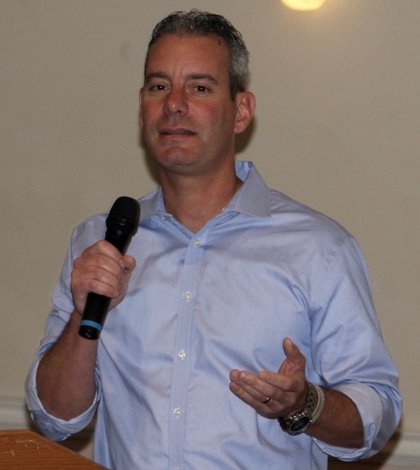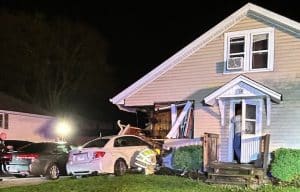Enterprise zone viewed as ‘win-win’ for region

Keith Moran
Jackson, Williams, Perry, Washington, Clinton, St. Clair and Madison counties all have something in common: they have at least one enterprise zone.
An enterprise zone is a statewide program designed to stimulate economic growth and neighborhood revitalization in economically depressed areas.
“Everybody in this area besides Monroe and Randolph County has an enterprise zone,” said Keith Moran, president of Moran Economic Development.
That may soon change, however, as Moran’s company is working with local stakeholders to establish an enterprise zone in Monroe and Randolph counties.
Moran spoke about these plans at a Columbia Chamber of Commerce meeting last Wednesday.
At the meeting, Moran explained details of the enterprise zone, including its purpose. Other stakeholders also spoke about the benefits of the zone.
“From an economic developer standpoint, I see this as a win-win situation for our area,” said Edie Koch, Monroe County Economic Development Corporation Executive Director. “It gives us an opportunity to be on the same playing field as our neighboring counties, with Missouri and with other states in the area.”
The counties have been working on getting the enterprise zone since January. The MCEDC has taken the lead on this endeavor.
“I appreciate the Monroe County Economic Development Corporation for taking the lead on this,” Columbia City Administrator Jimmy Morani said. “They got the ball rolling quickly. We were able to pull in Randolph County because we felt like this would be a stronger application if we looked at this regionally.”
Since the zone would be regional, it presents some challenges.
Moran explained the enterprise zone can only be 15 square miles, but it must be contiguous. His company is still developing the map of the zone, but currently it encompasses parts of Waterloo, Valmeyer, Columbia, Sparta, Red Bud, Chester and Evansville.
Moran said his firm will connect these disparate communities using three-foot strips, but he assured the important areas would all be within the enterprise zone.
“It’s very targeted, but what I can tell you is all our main commercial and industrial corridors here are planned to be in the zone,” he said.
The communities have different amounts of the zone in their area depending on size. Monroe and Randolph County will also work with these communities to help get the enterprise zone.
The communities are willing to work together because businesses in the zone receive tax incentives, regulatory relief and improved governmental services.
The major incentive is a 6.25 percent sales tax exemption on building materials to be used in the enterprise zone.
There are also two tax incentives that exempt large businesses from paying sales tax on equipment consumables, pollution control and utility.
Although it is unlikely any of the businesses currently within the zone will benefit from these latter two incentives, Moran said they are still helpful.
“While those don’t necessarily make that much of a difference to our smaller businesses, if we’re able to locate some larger folks with larger scale products, which do come around every so often, that can have a major impact on your business,” he said.
The final incentive is a .5 percent investment tax credit that will go to people investing in qualified areas in the zone.
Moran said he sees no disadvantage to being in an enterprise zone.
He also said all the incentives help achieve the goal of the program.
“We talk about recruitment of businesses and that’s certainly a goal of the enterprise zone program,” Moran said. “But more so, this program is about taking care of our existing businesses, retention of jobs and taking care of those folks who have been part of our community for many years.”
The enterprise zone program has existed for many years, beginning in 1982. There are currently about 102 enterprise zones in Illinois.
The zones originally lasted for 30 years, but communities could apply for an extension without any other areas getting the chance to apply.
Now, though, the state is opening up those slots for anyone to apply when zones expire.
There are 13 zones available this year and eight scheduled to be open next year. After that, Moran said there will be few opportunities to get an enterprise zone.
Moran estimated at least 20 applicants will file for an enterprise zone this year. These zones would last for 15 years with the opportunity for a 10-year extension.
To help bolster this area’s application, Moran requested businesses write a letter of support estimating how much money they would spend in the zone and how many jobs they would create or retain in 25 years.
“The more letters of support we can get, the better it looks to our local legislators, key stakeholders and the Illinois Department of Commerce – basically the people who make a recommendation on these enterprise zones,” Moran explained. “These letters have a direct impact on how well this application can be scored.”
The letters will help fulfill one of 10 criteria on the enterprise zone application.
They are due in October. The entire application must be complete by Dec. 31, but the Illinois Department of Commerce will not score it until May and June.
The IDOC will announce the areas awarded zones in September 2019. Those enterprise zones will start on Jan. 1, 2020.
Given the competitive application process, Moran said the teamwork used to get the zone will only benefit the area.
“In the end, what everybody does understand is if Waterloo lands a really nice project, that’s good for Columbia,” Moran explained. “And if Red Bud’s doing well, that’s good for Sparta. And so on.”






